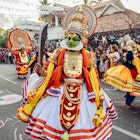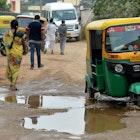
Bollywood and beyond: South India filming locations
Sep 26, 2019 • 5 min read

Pedestrians and rickshaws pass a movie theater in Chennai, Tamil Nadu in southern India © Frédéric Soltan / Getty Images
For the uninitiated, here is a revelation about Indian cinema. Contrary to what many believe, India’s multi-billion-dollar film industry is not hinged solely on Mumbai based, Hindi-centric Bollywood. A colossal number of movies are produced and shot in South India and the wheels of the South Indian film industry whirr furiously – turning over the equivalent of a healthy billion in USD$ a year from their productions.
Naturally, over the years, film crews from all over the world have turned their gaze to the stunning locales of South India for rich and varied backdrops to dramas, fantasies and personal tales. See if you can spot some of these places during your next visit.

The Hollywood take on Puducherry
Plenty of Hollywood filmmakers have used India as a setting. The French Quarter (White Town) in Puducherry features in Ang Lee’s CG-laden Life of Pi (2012), before the young protagonist finds himself adrift in the Pacific Ocean with a Royal Bengal tiger. This former French stronghold is today a popular seaside town with ‘rues’ for streets and unmistakably French architecture. It’s great for travellers who are partial to walking; you can gaze at French-styled villas with a spark of bright bougainvillea around the gates as you stroll and stop in at the Travaux Publics government building, which finds screen time in the movie. Glimpses of Kerala’s tea plantations can also be seen in the film.
Charmed by French India? Explore the outposts of Puducherry in nearby Kerala.

Spies, martial arts and action in Goa and Karnataka
In the southwest of India, Goa got its share of Hollywood credits when the Matt Damon vehicle, The Bourne Supremacy (2004), used the beaches as a setting for the super-spy’s attempts to find a new life away from the agency. The seaside beach resort of Palolem is actually depicted fairly accurately as a haven for sun-seeking foreigners who come here for the relaxing pace of life and plenty of tanning time.
King of martial arts, Jackie Chan, blessed the ancient ruins of Vijayanagar in Hampi with a cameo in The Myth (2005). He also used his star-power for a few lessons in civic pride, helping to clean up litter while he was shooting action and dance sequences around Hampi’s temples.
During its 14-week-long shooting schedule, British TV drama The Jewel in the Crown (1984) spanned several states in India, with Karnataka getting particular screen time. It was the royal palace of Mysuru, home to the Wodeyar Kings, where legendary British actress Geraldine James shared the screen with Zohra Sehgal, one of India’s acting stalwarts.
There are even more beaches in Goa than just Palolem, packed with golden sands and beautiful wildlife.

Bollywood films shot in Kerala, Tamil Nadu and Bengaluru
There are times when Bollywood has shaken off its fixation on filming in Switzerland for pastures closer to home. Chennai Express moved south to look for locations and made the tea estates of Munnar, the Vattamalai Murugan Temple in Coimbatore and the Pamban Bridge in Rameshwaram household names across India.
Other famous movies that have shown some love to the south include Guru (2007), which was shot by the famous Athirapally Falls near Munnar, as well as Nishabd (2007) and Rowdy Rathore (2012), which include scenes filmed at Melukote near Mysuru. The popular love saga Qayamat Se Qayamat Tak (1988) turned to Ooty’s pine forests and the arid hills of Kolar as sylvan settings for the stars to romance in.
But it is the blockbuster Bollywood film Sholay (1975) that made boulders thunder at Ramanagara near Bengaluru thanks mainly to the booming voice of the villain, Gabbar. His menacing question to his failed henchmen – kitne aadmi the? (how many men were there?) – has become one of the most quoted lines in India cinema.
Curious about these cinematic landscapes? Consider including a guided day trip to Athirappilly Falls in your itinerary.

Regional cinema of the south
Bollywood may have huge visibility, but regional cinema is the heavyweight money churner for single screen cinemas. The Telegu movie Baahubali 2 opened on 28 April 2017 and grossed US$194m in just 13 days. Most of it was shot in the rock gardens of Kurnool, as well as Athirappilly and Vazhachal Falls and the stunning Valparai region between Munnar and Coimbatore.
Rajinikanth, the larger than life superstar of the Tamil film industry, shoots regularly in Chennai. His 2007 hit Sivaji might have jumped continents to film in Spain and New York, but a large part of action takes place on the mean streets of Tamil Nadu’s capital.
Many movies have used Kerala as a handsome backdrop. Malayalam thriller Manichitrathazhu (1993), was shot in the grand Padmanabhapuram Palace in Trivandrum and the Hill Palace in Tripunithura near Kochi. Filmed in Mannuthy (near Thrissur) and other Keralan locations, high school romance Oru Adaar Love (2019) became a national hit after a clip of actress Priya Prakash Varrier winking went viral and became the anchor for countless memes across the nation.

Go behind the scenes at Ramoji Film City, Hyderabad
It would be heretical to discuss South Indian film without a mention of Ramoji Film City. Built in 1996 by Telegu film-producer Ramoji Rao, the largest integrated studio complex in the world has made it into the Guinness Book of World Records. The sprawling campus is not only a coveted location for filming, but also a major tourist sight, seeing 1.5 million footfalls each year. You can join a Film City Tour for an abridged peek at the main sets or browse the campus at your own pace; not a bad second-best to actually being on the silver screen.
Explore related stories

Cocktails
"These taverns are a wonderland" Goa's traditional bar culture is a glimpse into the pastFeb 10, 2020 • 5 min read





 ArtBangalore's pothole problems reimagined as the moon surface in this brilliant artistic video
ArtBangalore's pothole problems reimagined as the moon surface in this brilliant artistic videoSep 6, 2019 • 1 min read



